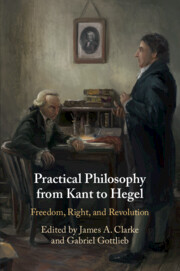Book contents
- Practical Philosophy from Kant to Hegel
- Practical Philosophy from Kant to Hegel
- Copyright page
- Contents
- Contributors
- Acknowledgments
- Abbreviations
- Introduction
- 1 The Original Empty Formalism Objection
- 2 Freedom and Ethical Necessity
- 3 Maimonides and Kant in the Ethical Thought of Salomon Maimon
- 4 Erhard on Right and Morality
- 5 Erhard on Revolutionary Action
- 6 Elise Reimarus on Freedom and Rebellion
- 7 Freedom and Duty
- 8 Fichte’s Ethical Holism
- 9 Jacobi on Revolution and Practical Nihilism
- 10 The Political Implications of Friedrich Schlegel’s Poetic, Republican Discourse
- 11 The Limits of State Action
- 12 Echoes of Revolution
- 13 Public Opinion and Ideology in Hegel’s Philosophy of Right
- Bibliography
- Index
9 - Jacobi on Revolution and Practical Nihilism
Published online by Cambridge University Press: 16 March 2021
- Practical Philosophy from Kant to Hegel
- Practical Philosophy from Kant to Hegel
- Copyright page
- Contents
- Contributors
- Acknowledgments
- Abbreviations
- Introduction
- 1 The Original Empty Formalism Objection
- 2 Freedom and Ethical Necessity
- 3 Maimonides and Kant in the Ethical Thought of Salomon Maimon
- 4 Erhard on Right and Morality
- 5 Erhard on Revolutionary Action
- 6 Elise Reimarus on Freedom and Rebellion
- 7 Freedom and Duty
- 8 Fichte’s Ethical Holism
- 9 Jacobi on Revolution and Practical Nihilism
- 10 The Political Implications of Friedrich Schlegel’s Poetic, Republican Discourse
- 11 The Limits of State Action
- 12 Echoes of Revolution
- 13 Public Opinion and Ideology in Hegel’s Philosophy of Right
- Bibliography
- Index
Summary
Prior to Hegel’s portrayal of the French Revolution’s “fanaticism for destruction,” F. H. Jacobi criticized the impoverished, abstract conception of reason that he sees realized in the politics, philosophy, and broader intellectual culture of the era.Inaugurating a tradition of reflection in German thought, Jacobi labels this conception “nihilism.” While Jacobi identifies and analyzes both the theoretical and the practical sides of nihilism, its basic sense is practical.Practical nihilism equates ideal rationality with the realization of a pure form, minus the “way of sensing [Sinnesart]” that allows us to see what is at stake in any situation. Jacobi further argues that one’s “way of sensing” is the source of individuality and so of one’s irreplaceable value as a person. For Jacobi, the otherwise diverse group including the French philosophes, Kant, and Fichte all exemplify practical nihilism in some manner or other.This account starts from Jacobi’s initial reactions to the French Revolution, eventually captured by the letter “To Erhard O.” (1792). This discussion establishes the core of Jacobi’s objection to his era’s dominant conception of rationality.The open letter “To Fichte” (1799) in which the charge of nihilism first appears is explicable against this decades-old concern on Jacobi’s part.
- Type
- Chapter
- Information
- Practical Philosophy from Kant to HegelFreedom, Right, and Revolution, pp. 157 - 173Publisher: Cambridge University PressPrint publication year: 2021



